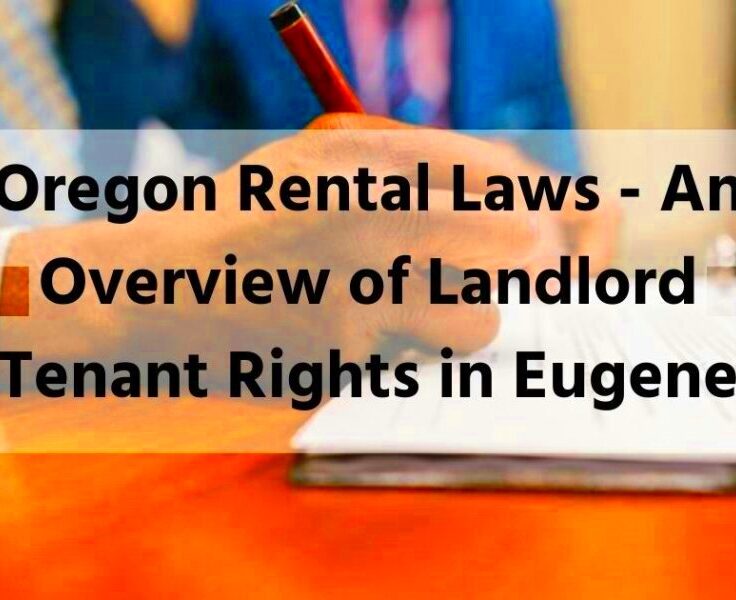Understanding Oregon Landlord-Tenant Rights
Understanding landlord-tenant rights in Oregon is essential for both parties involved in a rental agreement. These rights help to establish a fair and balanced relationship between landlords and tenants. Whether you are renting an apartment or a house, knowing your rights can prevent disputes and ensure a smooth renting experience. In this blog post, we’ll explore the key rights of both landlords and tenants, helping you navigate the rental landscape in Oregon with confidence.
Key Rights of Landlords in Oregon

Landlords in Oregon have several important rights that protect their interests. Here are some of the key rights:
- Right to Receive Rent: Landlords have the right to collect rent as agreed in the lease. Tenants must pay on time to avoid penalties.
- Right to Access the Property: Landlords can enter the rental property for necessary reasons, like repairs or inspections, but must provide proper notice to the tenant.
- Right to Evict Tenants: If tenants violate lease terms, landlords have the right to begin eviction proceedings after following legal procedures.
- Right to Retain Security Deposits: Landlords can keep a security deposit for unpaid rent or damages, provided they follow state laws regarding the amount and return.
- Right to Enforce Lease Terms: Landlords can enforce lease agreements and take action against tenants who do not comply.
Key Rights of Tenants in Oregon

Tenants in Oregon also enjoy several important rights that protect them while renting a property. Here are some of the key rights:
- Right to a Habitable Home: Tenants have the right to live in a safe and clean environment. Landlords must maintain the property and address significant issues like plumbing or heating problems.
- Right to Privacy: Tenants have the right to privacy in their rental home. Landlords must provide notice before entering the property, except in emergencies.
- Right to Fair Housing: Tenants cannot be discriminated against based on race, gender, religion, or other protected categories. Fair housing laws protect their rights.
- Right to Withhold Rent: In some cases, tenants may have the right to withhold rent if the landlord fails to make necessary repairs, after giving proper notice.
- Right to Challenge Eviction: Tenants have the right to contest eviction notices in court, ensuring that the landlord follows legal procedures.
Understanding Lease Agreements in Oregon
A lease agreement is a crucial document in any landlord-tenant relationship in Oregon. It outlines the terms and conditions of the rental arrangement, helping to protect both parties. Understanding these agreements can prevent misunderstandings and ensure that both landlords and tenants are aware of their responsibilities. Let’s break down the key components of a lease agreement in Oregon.
Typically, a lease agreement should include the following:
- Property Details: The address and description of the rental property should be clearly stated.
- Lease Duration: Specify whether it’s a month-to-month lease or a fixed-term lease, such as a year.
- Rent Amount: Clearly outline the monthly rent amount and when it’s due.
- Security Deposit: State the amount of the security deposit and the conditions for its return.
- Maintenance Responsibilities: Define which party is responsible for maintenance and repairs.
- Termination Conditions: Include the process for ending the lease, including notice requirements.
By carefully reviewing the lease agreement and understanding its terms, both landlords and tenants can foster a positive rental experience in Oregon.
Process of Eviction in Oregon
Eviction is a legal process that landlords must follow to remove a tenant from a rental property. Understanding this process is essential for both landlords and tenants. Here’s how eviction typically works in Oregon:
1. Notice to Tenant: The landlord must provide a written notice, explaining the reason for the eviction, such as failure to pay rent or violating lease terms. The notice period varies based on the reason:
| Reason for Eviction | Notice Period |
|---|---|
| Nonpayment of Rent | 72 hours |
| Violation of Lease | 30 days |
| Month-to-Month Termination | 30 days |
2. Filing for Eviction: If the tenant does not comply with the notice, the landlord can file an eviction lawsuit in the appropriate court.
3. Court Hearing: Both parties will have the opportunity to present their case. If the court rules in favor of the landlord, a judgment will be issued.
4. Execution of Eviction: If necessary, law enforcement may be involved to carry out the eviction.
Being informed about the eviction process can help tenants respond appropriately if they receive an eviction notice.
Security Deposits and Refunds in Oregon
Security deposits are an essential part of the rental process in Oregon. They provide landlords with a financial safety net for any damages or unpaid rent when tenants move out. Understanding the rules around security deposits can protect both landlords and tenants. Here’s what you need to know:
- Amount of Security Deposit: In Oregon, landlords can charge a security deposit of up to two months’ rent for residential properties.
- Written Agreement: It’s important to outline the security deposit terms in the lease agreement, including the amount and conditions for return.
- Return of Deposit: After a tenant moves out, the landlord must return the security deposit within 31 days, minus any deductions for damages or unpaid rent.
- Itemized List: If deductions are made, landlords must provide an itemized list of damages along with the remaining deposit.
By understanding the rules surrounding security deposits, both landlords and tenants can ensure a smoother rental experience and avoid disputes when it comes time to move out.
Repair and Maintenance Responsibilities
When it comes to renting a property in Oregon, understanding repair and maintenance responsibilities is key for both landlords and tenants. Clear communication about who is responsible for what can prevent disputes and ensure that the rental property remains safe and habitable.
In general, here’s how repair and maintenance responsibilities are divided:
- Landlord Responsibilities: Landlords are required to maintain the property in a habitable condition. This includes:
- Ensuring proper plumbing, heating, and electrical systems are functioning.
- Repairing issues like leaky roofs, broken windows, and pest infestations.
- Providing necessary safety features, such as smoke detectors and carbon monoxide detectors.
- Tenant Responsibilities: Tenants also have responsibilities to maintain the property. These typically include:
- Keeping the property clean and sanitary.
- Promptly reporting any maintenance issues to the landlord.
- Avoiding damage to the property caused by negligence or misuse.
It’s important for both parties to document any repairs and maintenance requests in writing. This can help clarify responsibilities and protect both landlords and tenants from potential disputes.
Discrimination and Fair Housing in Oregon
Discrimination in housing is illegal in Oregon, and understanding fair housing laws is crucial for both landlords and tenants. These laws are designed to ensure everyone has equal access to housing regardless of certain characteristics. Here’s what you need to know about discrimination and fair housing in Oregon:
The protected classes under Oregon law include:
- Race
- Color
- National origin
- Sex
- Disability
- Familial status (having children under 18)
- Religion
- Sexual orientation
- Gender identity
- Marital status
Landlords must not discriminate against tenants based on any of these characteristics when renting their properties. This means they cannot:
- Refuse to rent to someone based on their protected status.
- Set different rental terms or conditions based on discrimination.
- Harass or intimidate tenants because of their protected status.
Tenants who believe they have experienced discrimination can file a complaint with the Oregon Bureau of Labor and Industries (BOLI) or seek legal counsel. Understanding these rights is essential for creating a fair and inclusive rental environment.
FAQs about Oregon Landlord-Tenant Rights
Having questions about landlord-tenant rights is common, and understanding these rights can help clarify the rental process. Here are some frequently asked questions regarding landlord-tenant rights in Oregon:
- What should I do if my landlord won’t make repairs? If your landlord is not addressing maintenance issues, document your requests and consider sending a formal notice. If repairs are still not made, you may have the right to withhold rent or make the repairs yourself and deduct the costs.
- Can my landlord enter my rental unit without notice? Generally, landlords must give at least 24 hours’ notice before entering your unit, except in emergencies. Make sure you know your rights regarding privacy.
- How much notice does my landlord need to give for an eviction? The notice period depends on the reason for eviction, ranging from 72 hours for nonpayment of rent to 30 days for other lease violations.
- What is the maximum security deposit a landlord can charge? In Oregon, the maximum security deposit is two months’ rent for residential properties.
- Can I be evicted for having guests over? Having guests is typically allowed, but if your guests are causing disturbances or violating lease terms, it could lead to eviction proceedings.
Understanding these common questions and their answers can empower both landlords and tenants, fostering a more positive rental experience in Oregon.
Conclusion on Oregon Landlord-Tenant Rights
Understanding landlord-tenant rights in Oregon is essential for fostering a healthy rental relationship. By knowing your rights and responsibilities, whether you’re a landlord or a tenant, you can avoid conflicts and create a more harmonious living situation. Landlords must maintain safe and habitable conditions while tenants should uphold their end of the lease by respecting the property and paying rent on time. Remember, clear communication and written agreements are key to ensuring both parties are on the same page. If disputes arise, being informed about your rights can help you navigate the legal landscape effectively, ensuring fair treatment for everyone involved.


